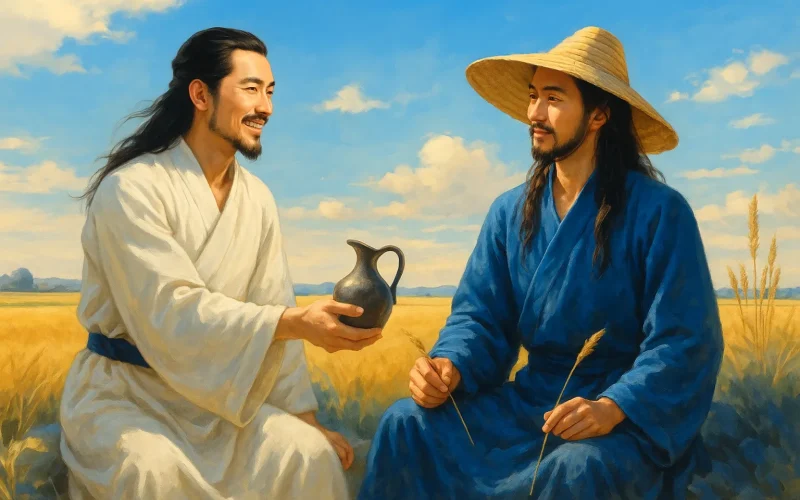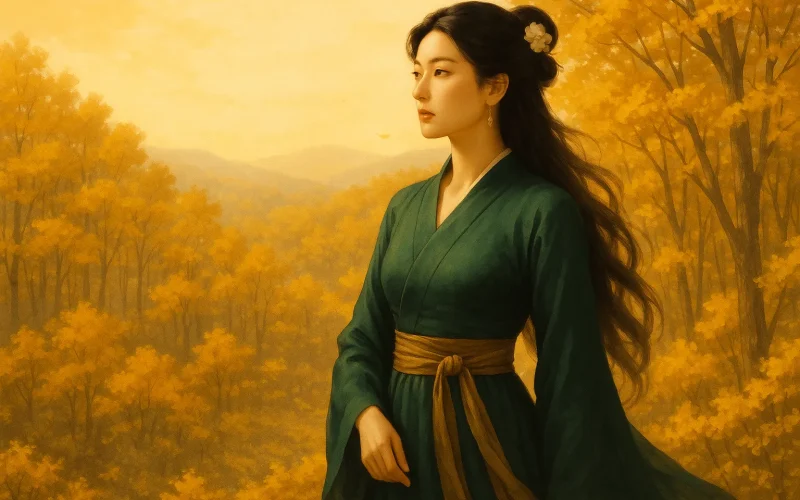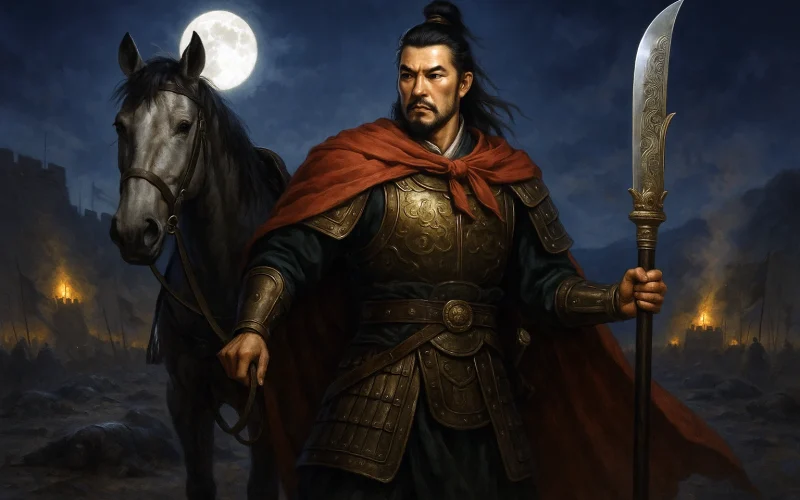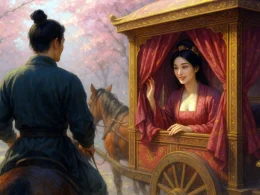I met with Du Fu atop the Rice Hill peak;
At noonday he wore a hat of bamboo.
I ask him since we parted why he’s grown so lean and weak.
It’s all because he’s making verse with pains undue
Original Poem
「戏赠杜甫」
李白
饭颗山头逢杜甫,顶戴笠子日卓午。
借问别来太瘦生,总为从前作诗苦。
Interpretation
Composed during the Tianbao era of the Tang Dynasty, this poem captures a spontaneous encounter between Li Bai and Du Fu in Luoyang, where their mutual admiration blossomed into profound friendship. Both poets poured passion into their craft and sought solace in verse during political disillusionment. While Li Bai excelled in untrammeled romanticism, Du Fu became known for his poignant depth. This work, a lighthearted improvisation upon meeting Du Fu, blends humorous banter with genuine care, reflecting Li Bai's characteristic wit and heartfelt camaraderie.
First Couplet: "饭颗山头逢杜甫,顶戴笠子日卓午。"
Fàn kē shāntóu féng Dù Fǔ, dǐng dài lìzi rì zhuó wǔ.
On Rice-Grain Mountain I met Du Fu; Wearing a bamboo hat beneath the glaring noon sun.
The opening lines paint a casual encounter with vivid simplicity. "Rice-Grain Mountain" (likely a minor peak near Chengdu) anchors the scene in everyday reality. Du Fu's bamboo hat under the "glaring noon sun" creates a striking visual—both mundane and poetic—immediately establishing the poem's unpretentious, life-like atmosphere.
Second Couplet: "借问别来太瘦生,总为从前作诗苦。"
Jièwèn bié lái tài shòu shēng, zǒng wèi cóngqián zuò shī kǔ.
I teased, "Since we parted, you've grown so thin—Surely it's from composing poems with such pain!"
The couplet masterfully blends humor and empathy. The playful inquiry about Du Fu's thinness carries layered meaning: superficially mocking his frail appearance, yet profoundly acknowledging his artistic dedication. "Composing with pain" hints not merely at creative struggle but also at Du Fu's deep anxieties about state and society. Beneath the jest lies sincere understanding of his friend's spiritual burdens.
Holistic Appreciation
Though framed as a "playful gift," this poem radiates authentic emotion, revealing the deep bond between the two literary giants. Li Bai first sketches their accidental meeting with plain strokes, then humorously chides Du Fu's emaciation—a jest that conveys concern and recognition. The language is unadorned and natural, reading like casual banter yet brimming with unspoken affection.
Despite their differences in style, temperament, and life paths, Li Bai and Du Fu shared resonances in literary ideals and life pursuits. Du Fu's "pain" in poetry reflected not just artistic effort but also his devotion to nation and people. Li Bai, though known for his free-spiritedness, understood this "pain" intimately—a mutual comprehension that formed the foundation of their friendship.
Artistic Merits
- Lighthearted Language Rich with Life: Images like "Rice-Grain Mountain" and "bamboo hat" ground the poem in daily experience, creating vitality and visual immediacy.
- Humor Infused with Depth: The witty concern about Du Fu's thinness blends jest with genuine care, making the emotion feel both natural and profound.
- Brevity with Profound Meaning: In just four lines, the poem captures the essence of a great friendship, balancing casualness and depth with lasting resonance.
Insights
This poem demonstrates how true friendship thrives on mutual understanding and respect. Beyond companionship, it represents spiritual resonance and support. Whether in artistic creation or life's journey, everyone faces hardships—and having someone who truly comprehends and cares for you is priceless happiness. Through its playful tone, the poem reminds us to cherish genuine friends, appreciate each other's talents, and navigate life's peaks and valleys together.
About the poet

Li Bai (李白), 701 - 762 A.D., whose ancestral home was in Gansu, was preceded by Li Guang, a general of the Han Dynasty. Tang poetry is one of the brightest constellations in the history of Chinese literature, and one of the brightest stars is Li Bai.












